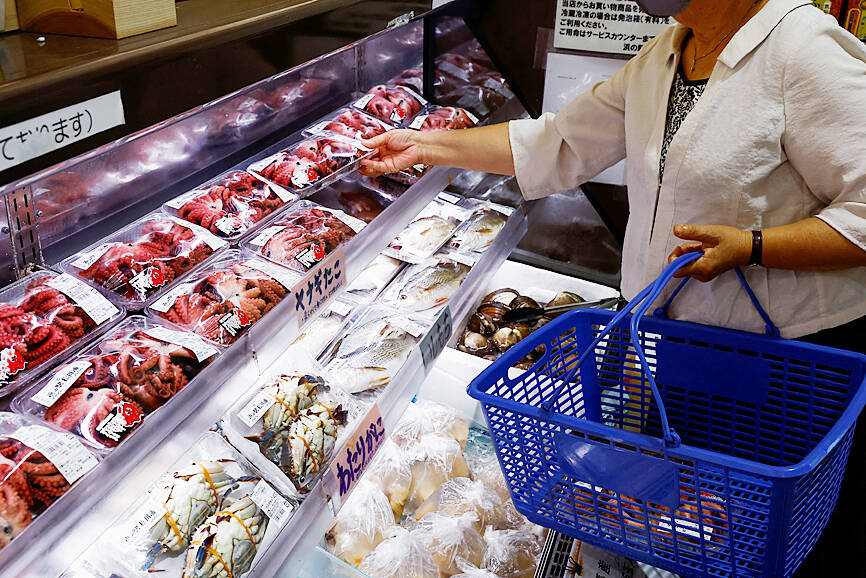The Food and Drug Administration (FDA) yesterday officially announced the cancelation of the requirement for a certificate of origin for Japanese food imports to Taiwan, effective immediately.
It means that food products from five prefectures — Fukushima, Ibaraki, Tochigi, Gunma and Chiba — would be fully deregulated and subject to the same management standards as food from other countries. Experts emphasize that future management should still be adjusted on a rolling basis.
According to FDA statistics, Taiwan has conducted more than 270,000 border radiation inspections on Japanese food products since 2011, with a failure rate of 0 percent. Based on the latest risk assessment, the radiation exposure to the Taiwanese public from Japanese food is considered “negligible.”

Photo: REUTERS
FDA Director-General Chiang Chih-kang (姜至剛) said that this adjustment was made based on international and domestic scientific evidence.
According to publicly available information from the International Atomic Energy Agency, the Japanese government has established a comprehensive monitoring system and adjusts domestic regulatory measures on a rolling basis according to testing results, effectively ensuring the safety of the food supply chain, he said.
Under the principle of ensuring food safety for the public, scientific evidence and international standards, the review of Japanese food products would return to source-based management and general border sampling, Chiang said.
No objections were received during the consultation period, and thus the adjustment is now officially aligned with the approach used for other countries, with sampling and inspection based on food risk classification, he said.
The only countries and territories still applying special regulations to Japanese food are China, Hong Kong, Macau, South Korea and Russia.
President William Lai (賴清德) on Thursday responded to China’s suspension of Japanese seafood imports by sharing photos on social media of himself enjoying miso soup and sushi made with seafood from Kagoshima and Hokkaido.
Chiang said the timing was entirely coincidental.
“It just happens that the administrative process has reached this point,” he said.
Regarding the full deregulation of food from the five prefectures, Yen Tzung-hai (顏宗海), director of the Clinical Toxicology Center at Linkou Chang Gung Memorial Hospital, yesterday said that this change simply shifts the food from “special control” back to “general management.”
Radiation safety standards have not been relaxed in any way, he said, adding that Taiwan still maintains the regulation that the total amount of cesium-134 and cesium-137 in food must not exceed 100 becquerel per kilogram.

Right-wing political scientist Laura Fernandez on Sunday won Costa Rica’s presidential election by a landslide, after promising to crack down on rising violence linked to the cocaine trade. Fernandez’s nearest rival, economist Alvaro Ramos, conceded defeat as results showed the ruling party far exceeding the threshold of 40 percent needed to avoid a runoff. With 94 percent of polling stations counted, the political heir of outgoing Costa Rican President Rodrigo Chaves had captured 48.3 percent of the vote compared with Ramos’ 33.4 percent, the Supreme Electoral Tribunal said. As soon as the first results were announced, members of Fernandez’s Sovereign People’s Party

MORE RESPONSIBILITY: Draftees would be expected to fight alongside professional soldiers, likely requiring the transformation of some training brigades into combat units The armed forces are to start incorporating new conscripts into combined arms brigades this year to enhance combat readiness, the Executive Yuan’s latest policy report said. The new policy would affect Taiwanese men entering the military for their compulsory service, which was extended to one year under reforms by then-president Tsai Ing-wen (蔡英文) in 2022. The conscripts would be trained to operate machine guns, uncrewed aerial vehicles, anti-tank guided missile launchers and Stinger air defense systems, the report said, adding that the basic training would be lengthened to eight weeks. After basic training, conscripts would be sorted into infantry battalions that would take

GROWING AMBITIONS: The scale and tempo of the operations show that the Strait has become the core theater for China to expand its security interests, the report said Chinese military aircraft incursions around Taiwan have surged nearly 15-fold over the past five years, according to a report released yesterday by the Democratic Progressive Party’s (DPP) Department of China Affairs. Sorties in the Taiwan Strait were previously irregular, totaling 380 in 2020, but have since evolved into routine operations, the report showed. “This demonstrates that the Taiwan Strait has become both the starting point and testing ground for Beijing’s expansionist ambitions,” it said. Driven by military expansionism, China is systematically pursuing actions aimed at altering the regional “status quo,” the department said, adding that Taiwan represents the most critical link in China’s

EMERGING FIELDS: The Chinese president said that the two countries would explore cooperation in green technology, the digital economy and artificial intelligence Chinese President Xi Jinping (習近平) yesterday called for an “equal and orderly multipolar world” in the face of “unilateral bullying,” in an apparent jab at the US. Xi was speaking during talks in Beijing with Uruguayan President Yamandu Orsi, the first South American leader to visit China since US special forces captured then-Venezuelan president Nicolas Maduro last month — an operation that Beijing condemned as a violation of sovereignty. Orsi follows a slew of leaders to have visited China seeking to boost ties with the world’s second-largest economy to hedge against US President Donald Trump’s increasingly unpredictable administration. “The international situation is fraught